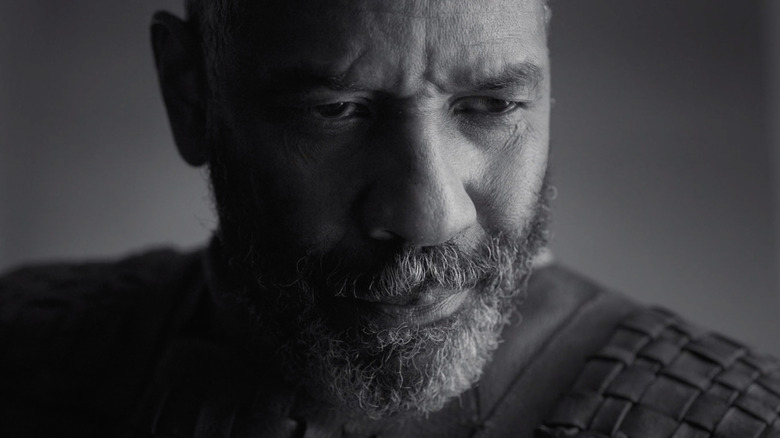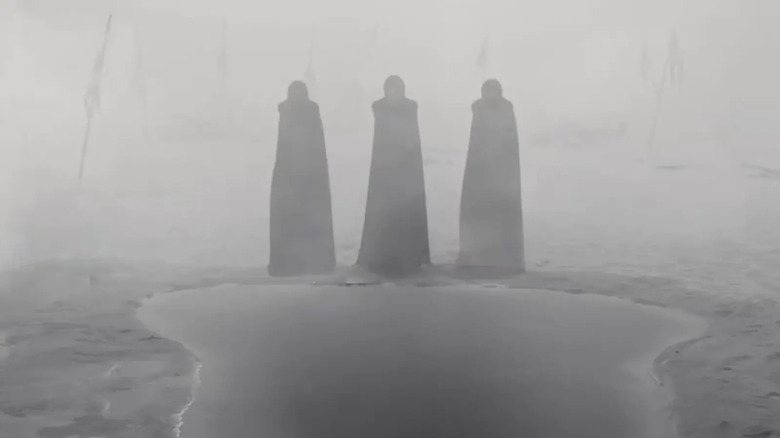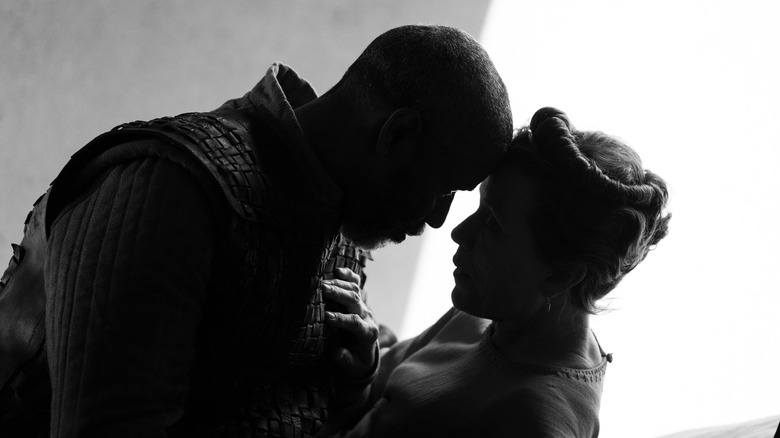The Tragedy Of Macbeth Review: Denzel Washington And Frances McDormand Cut A Bloody Swathe Through Joel Coen's Expressionist Nightmare [NYFF]
"Life is but a walking shadow," Denzel Washington's Macbeth quietly bemoans as he sees the beginning of the end of his short and violent reign in Joel Coen's explosive adaptation of The Scottish Play. Coen's "The Tragedy of Macbeth," strong emphasis on the "tragedy," is the latest in a long line of adaptations of the Shakespeare classic, but it's easily the most thrillingly modern, strikingly minimalist of the bunch. And it does so by operating from the shadows — literally, in the case of Coen and cinematographer Bruno Delbonnel's choice to shoot the film in black-and-white and almost exclusively in silhouettes; but also spiritually, in a film that is the harshest and most cynical iteration of "Macbeth."
I probably don't have to recount in too much detail the plot of "Macbeth." A celebrated Scottish general named Macbeth (Washington) receives a prophecy from a trio of witches that he will become King of Scotland, leading him down a path of bloody betrayals and cold-blooded assassinations that send both him and his wife Lady Macbeth (Frances McDormand, terrifying and terrific) on a quick descent into madness. But as loyal as Coen (directing solo for the first time and doing so without a single stumble) is to the dialogue and tone of the Shakespeare play — even playing up some of the latent humor of the Bard — there are various innovations that transform "The Tragedy of Macbeth" into a form of a dread-filled psychological thriller.
Bold Strokes in Black and White
Anchored by a ferocious Washington, who threatens to rip that Oscar right out of the throat of the Academy with his bare teeth, "The Tragedy of Macbeth" is an otherworldly masterwork that owes its bold strokes and striking black-and-white imagery — all dark silhouettes and stark white backgrounds full of fog (or more ominously, smoke) — to that of the German expressionism and seedy noirs. The unforgiving stone castles of Scotland and its barren moors — full of little else but withered branches and lots of fog — cast deep, dark shadows from within which the ambitious Macbeth and his equally greedy wife plot and scheme. When they emerge into the light, to march upon sand that looks as white as snow or pale stone walls untouched by man, it's only to spray black pools of blood onto it or see visions of their own doom.
"The Tragedy of Macbeth" is one of the most beautiful films this year, breathtaking in Coen and Delbonnel's mastery of the black-and-white color scheme, which cast its heroes in light and its villains in shades of grey or shadow. The abundant use of silhouettes, jagged cliffsides, and long shadowy archways echo those of German expressionist films, but also look eerily akin to shadow puppetry, as if human characters (clad in stiff capes and body-hugging outfits that aid in creating those sharp silhouettes) in "The Tragedy of Macbeth" are simply acting out a shadow puppet play that has happened over and over again.
But as inspired as Coen and Delbonnel are by films such as the "Cabinet of Dr. Caligari" or even those expressionist elements filtered through the works of Ingmar Bergman (yes, I won't be the first to call attention to the visual similarities to "The Seventh Seal," and I won't be the last), "The Tragedy of Macbeth" has an almost ascetic look to it that is in direct opposition to the scorching performances by the incredible cast.
A King Among Performers
Washington gives a barn-burner of a performance as Macbeth, fierce and frightening and nearly unhinged, especially in the latter half of Macbeth's descent into madness as the hated Tyrant. But before he gets accused of being too showy, Washington — who has done this Shakespeare rodeo before, playing Prince Aragon in Kenneth Branagh's 1993 adaptation of "Much Ado About Nothing" and starring in the 2005 production of "Julius Caesar" — brings to the role a resigned weariness that a younger actor would not be able to achieve. As if he's accepted from the beginning that this meteoric rise to power can only end in doom. There's always an inevitability to "Macbeth," the cautionary tale of how knowledge and power corrupts. As soon as Macbeth hears the prophecy from the three witches, he's signed his fate, and Washington plays it as a man who both knows and struggles against this vicious cycle.
Therein lies the genius of casting "older" actors like Washington and McDormand. As a noble couple in their 60s, they grasp at the opportunity for power that might have passed them by when they were younger — and that they may not receive again. So there's a desperation to each of their actions, especially as Macbeth becomes possessed with the same bloodlust that Lady Macbeth had at the beginning, while McDormand's Lady Macbeth becomes wracked with the guilt that her husband felt at the beginning. They are the true standout stars of the film, injecting "The Tragedy of Macbeth" with a bitterness and fragility and sensuality that feels thoroughly modern.
But the rest of the supporting cast are no slouches either. Kathryn Hunter, who plays the witches as a Smeagol-like contortionist who has the ability to turn the two shadows she casts into a pair of faceless cloaked creatures, is a sinister standout. As is Alex Hassell as the conniving thane Ross, wearing what can only be described as a body suit with a hooded cape, and knowing he looks good in it. Corey Hawkins continues his rise to movie stardom as the noble Macduff, Macbeth's would-be slayer, while Bertie Carvel gives a wonderfully tragic performance as Banquo. Of course, there's the unexpectedly hilarious surprise of Stephen Root as a drunken porter, one of the major sources of levity in the bleak assault that is Coen's "The Tragedy of Macbeth." Apart from a few shaky child actors (Shakespeare is hard!) the performances are across the board fantastic.
Coen shows an understanding of Shakespeare's original play as well as a willingness to go beyond it. His "Tragedy of Macbeth" leans into the staginess of the story, while tapping into the surreal nightmare of the whole thing. It's nothing short of magnificent.
/Film Rating: 9.5 out of 10


